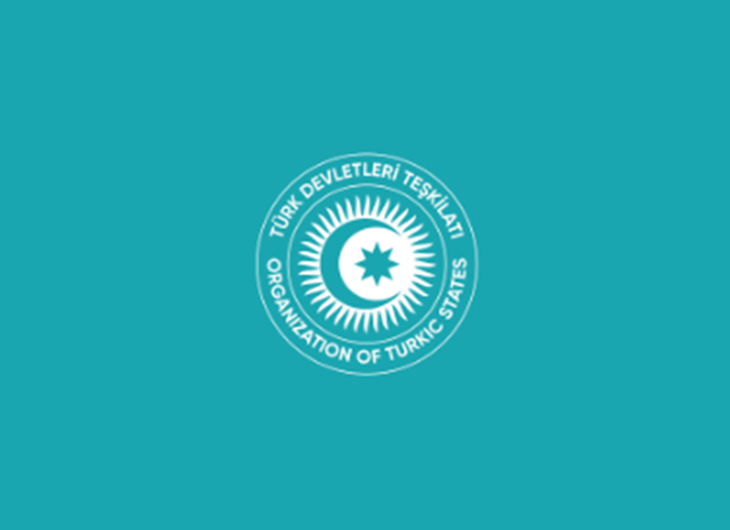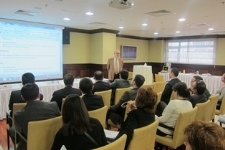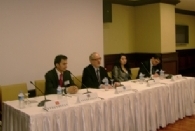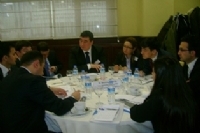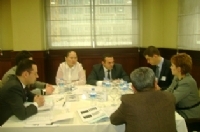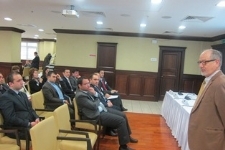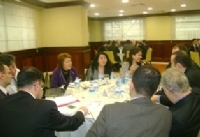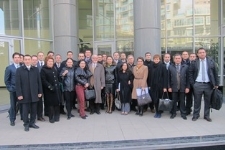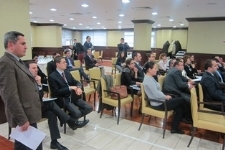The Four Working Groups, which were established by the Ministers of Economy or Ministers in Charge of Economy representing the members of the Turkic Council, held their first meeting on 15-16 March 2012 in Istanbul.
The mandate of the WGs, as defined in the Ministerial Communique dated 13 October 2011, is “to conduct studies and prepare proposals” in respective areas, with the aim of enhancing economic cooperation and trade amongst Turkic States.
Upon mutual assessment of existing problems hindering effective economic cooperation and trade the Working Groups decided to present the following recommendations to Ministers of Economy or Ministers in Charge of Economy representing the members of the Turkic Council.
I. WORKING GROUP ON IMPROVING THE INVESTMENT CLIMATE
1. Launching an investment climate assessment survey to identify difficulties and obstacles encountered in each member country, and provide recommendations to overcome them. A draft concept Note of this analysis will be distributed by TOBB to all parties by June 2012.
2. Studying the feasibility of signing a Multilateral Agreement on Investment Protection and Promotion and a Multilateral Agreement on the Avoidance of Double Taxation among member countries:
a) In this context, the parties recommended Kazakhstan to prepare a draft Concept Paper outlining the main principles and provisions of the draft Agreement on Investment promotion and protection, with due consideration for current bilateral agreements in force by the meeting of the Ministers of Economy or Ministers in Charge of Economy representing the members of the Turkic Council to be planned for July 2012. The draft will be circulated to the relevant authorities of the parties for their views and further recommendations.
b) In a similar vein, the parties recommended Kyrgyzstan to prepare a draft Concept Paper outlining the main principles and provisions of the draft Agreement on the avoidance of double taxation, with due consideration for current bilateral agreements in force by the meeting of the Ministers of Economy or Ministers in Charge of Economy representing the members of the Turkic Council to be planned for July 2012. The draft will be circulated to relevant authorities of the parties for their views and further recommendations.
3. Studying the feasibility of establishment of the Arbitration Body of the Turkic Council. In this context TOBB (the Union of Chambers and Commodity Exchanges of Turkey) agreed to prepare a draft Concept Paper by June 2012. The draft will be circulated to the related authorities of the parties for their views and further recommendations.
4. Setting up a “Joint Investment Promotion Portal of the Turkic Council” in the form of a joint web portal that will provide detailed information on investment climate and investment projects of member countries as well as tender announcements. The Secretariat of the Turkic Council will take responsibility for setting up this portal by July 2012 in accordance with the information submitted by the parties.
5. Exchange the necessary statistics and other relevant information pertaining to investors who have already invested in their respective countries. In this context, the Ministry of Economy of the Republic of Turkey agreed to prepare a draft Memorandum of Understanding by the meeting of the Ministers of Economy or Ministers in Charge of Economy representing the members of the Turkic Council to be planned for July 2012. The draft will be circulated to the related authorities of the parties for their views and further recommendations.
6. Exploring the possibilities of arranging joint experience-sharing programs aimed at improving investment climate. In this context, the Ministry of Economy of the Republic of Turkey agreed to prepare a draft Memorandum of Understanding by the meeting of the Ministers of Economy or Ministers in Charge of Economy representing the members of the Turkic Council to be planned for July 2012. The draft will be circulated to the related authorities of the parties for their views and further recommendations.
7. Creating platforms for sustained business dialogue which will bring together investors, investment promotion agencies and relevant public authorities of member countries. In this context, the Ministry of Economy of the Republic of Turkey agreed to prepare a draft Memorandum of Understanding by the meeting of the Ministers of Economy or Ministers in Charge of Economy representing the members of the Turkic Council to be planned for July 2012. The draft will be circulated to the related authorities of the parties for their views and further recommendations.
8. Conducting an analysis in international trade complementarities at the sectoral and / or regional level in order to improve international trade and enhance investment opportunities in member countries. A draft Concept Note of this analysis will be distributed by TOBB to all parties by June 2012.
II. WORKING GROUP ON DIVERSIFICATION OF ECONOMY
1. Signing of Memorandum of Understanding among Investment Promotion Agencies of Member States (draft Memorandum of Understanding will be prepared and submitted by the Secretariat by 15th of April 2012).
2. Conducting analysis by 1st of May 2012 on priority economic sectors in member countries and recommending measures to be taken for cooperation.
3. In order to strengthen economic cooperation it is offered to hold Business Forums and Exhibition of Export oriented products of the Member States on the rotation basis (The Secretariat offers to hold the First Business Forum and Exhibition parallel to the 2nd Summit of the Turkic Council which will be held in Kyrgyz Republic on August 2012).
4. Establishment of “Mechanism” by the Secretariat to use the contributions of International Development Agencies and other International organizations to channel funds for the development of least developed regions of Member States with a view to promoting employment and reducing poverty.
5. Establishment of mechanism and an internet portal providing information on public procurements and tenders opportunities of Member States.
III. WORKING GROUP ON DEVELOPMENT OF TRANSPORT
1. Enlargement of the Working Group to include experts from relevant national authorities, most notably Ministries of Transportation and Customs Administrations. This would particularly enhance implementation of agreed projects. National Secretariats for TRACECA could also be involved. In this regard:
• Governments are requested to designate their additional representatives by the end of April 2012;
• Members of the enlarged WG shall communicate their views and proposals on time tables regarding WG recommendations to the Secretariat by the end of May 2012.
2. To evaluate the utility of the establishment of a Joint Caspian Transport Company, in order to facilitate and expedite Caspian Sea crossings, which is the central transport corridor linking Turkic states. The Company would introduce regular schedules, reasonable prices and suitable vehicles for land transport operators.
3. Review of existing road infrastructure connecting Caspian ports to national and international road networks including Black Sea and Mediterranean ports of Turkey, with a view to developing internationally funded joint projects for their improvement to bear additional transit and bilateral commercial traffic.
4. Accession of Turkic Council member states to multilateral trade facilitation instruments, to formalize existing cooperation on the legal level. Instruments such as ATA system of the World Customs Organization would greatly facilitate foreign trade procedures.
5. Liberalization of land transport to the maximum extent possible, to reduce current obstacles in trade. This would include measures such as phasing out of restrictive practices among Turkic Council member states and establishment of a mechanism to facilitate longer-term visas for truck drivers.
6. Facilitating the use of Turkish ports and logistics centers by landlocked Turkic Council member states, in order to provide faster access to world markets and to vitalize the central transportation corridor across the Caspian Sea.
7. Authorization of the Turkic Council to establish regular contacts with third parties, to enable cooperation with neighbouring countries as necessitated by joint projects. This would include neighbouring countries within the region as well as important linkage countries in adjacent regions.
8. Tasking the Turkic Council to engage in partnerships with international finance institutions, in order to find funding for joint infrastructure improvement projects in the fields of transportation and trade facilitation (customs).
IV. WORKING GROUP ON ENTREPRENEURSHIP AS THE BASIS OF ECONOMIC RELATIONS
1. Organizing joint Turkic countries trade fairs and business forums during Turkic Business Council meetings, which will be held annually in the country of the Chairman member-state.
2. Sharing best practices amongst member-states’ firms and organizing training seminars. Emphasizing the leading role of TOBB and its experience in organizing such kind of seminars, working group agreed to propose holding the first training program under TOBB’s coordination.
3. Taking into consideration the vital role of commercial councilors in improving trade and economic relations, working group agreed to propose having an official commercial representative for every member-state in each member country.
4. Taking into consideration the liabilities of the parties in the framework the international agreements, working group suggests to evaluate the possibility of signing multilateral preferential trade agreement amongst member-states.
5. Signing joint memorandum of understanding among small and medium scale entrepreneurship associations of member-states.
6. Signing joint memorandum of understanding in the field of standardization amongst member-states.
7. Establishing “Joint Business Information Data Exchange Base” with electronic trade joint web portal and electronic economic map of the countries to support the producers for using of modern methods and technologies of trade.
The Working Groups undertook to inform relevant national authorities of the above recommendations.
The Working Groups agreed to continue its interaction through diplomatic channels, under the coordination of the Secretariat of the Turkic Council. The members undertook to inform each other of possible feedbacks and/or proposals from their respective national authorities.


